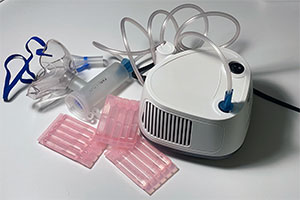Dwellness™ • Nebulizer Instructions — Awake
Nebulizer Instructions — Awake
Dwellness™ customization for:
Your Patient
InnoSpire Elegance User Manual

General Principles
[NOTE: If the nebulizer treatment is aversive, your patient will usually let you know by resisting and trying to push it away. If this happens, patiently encourage your patient and keep trying for a short time. If your patient continues, simply stop the treatment temporarily and try again after a break.]
Process
How to tell when the nebulizer is needed- When your patient has a pulmonary infection or breathing problems
- When there is a suspicion that your patient might have some pulmonary problems
- When your patient is having trouble exhaling — wheezing
- During certain seasons, use the nebulizer to avoid pulmonary problems or infections
- In these cases, use the nebulizer once or twice daily
Procedures
[NOTE: A very good distraction that helps avoid resistance is using the drum machine on your patient's lap while you perform the nebulizer treatment.]
Nebulizer cup and mask- Use the Pari LC PLUS Nebulizer cup, or equivalent
- Use Airlife Adult Aerosol Mask, or equivalent
- Be sure your patient is seated and secured in a chair before treatment
- Connect the tubing to the compressor
- Insert one end of the Wing Tip tubing to the air outlet on the compressor
- It should fit snugly
- Load the medication
- Remove the nebulizer insert by twisting counter-clockwise until it stops and lift up
- Pour the prescribed dose of medication into the nebulizer cup
- Never fill past the max. fill line of 8ml for the LC PLUS
- Replace the nebulizer insert making sure the two alignment rings are lined up with each other
- Attach the tubing to the nebulizer cup
- Attach the mouthpiece or mask
- If using the mouthpiece
- Attach the mouthpiece to the nebulizer outlet with the expiratory valve facing up
- Attach the inspiratory valve cap by pressing it firmly into the top of the nebulizer
- If using the mask
- Attach the mask to the nebulizer outlet with the nosepiece up
- Be sure the mask is covering your patient's nose and mouth
- If your patient is comfortable and calm, use the strap to hold the mask in place
- If your patient is resisting at all, hold the mask by hand and patiently talk your patient through the process
[NOTE: There are three medications that can be used for nebulizer treatments, depending the condition of your patient's lungs or the severity of the problems at hand.]
→ CAUTION: Always carefully follow the prescription directions printed on the labels. When in doubt, consult the nursing staff. ←
- Budesonide
- Administer Budesonide in a nebulizer at the first signs of lung congestion/wheezing
- Do not use for upper airway congestion
- Limit use to one day of early intervention, and switch to Levalbuterol if symptoms persist
- Levalbuterol
- Administer Levalbuterol in a nebulizer if lung congestion/wheezing persist after the early intervention with Budesonide
- If symptoms persist or get worse after one day, consult Mayo Clinic pulmonology
- Optional — Sodium Chloride Inhalation Solution, USP 0.9%
- In cases of mild respiratory problems, or prophylactically
- 1 vial exclusively in nebulizer for therapeutic effect
- In cases of moderate to severe respiratory problems
- Add Sodium Chloride to Levalbuterol in nebulizer treatment
→ CAUTION: Do NOT use Albuterol. Your patient is allergic to it. Levalbuterol is a different medication, and is safe to use. ←
Dwellness input from HPCA and family caregivers can serve to improve the ongoing support system. Feel free to speak up!
 Dwellness
Dwellness